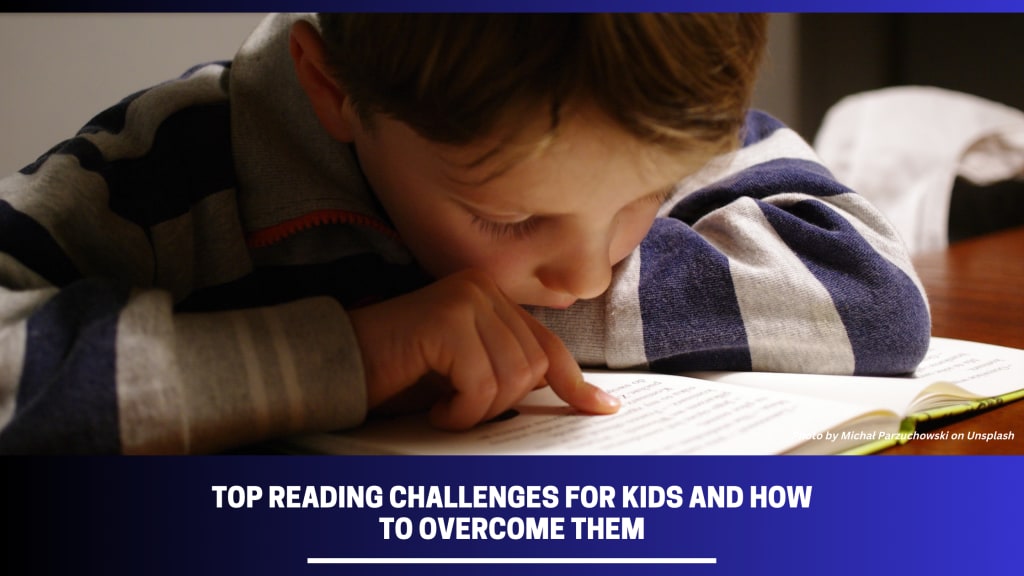Top Reading Challenges for Kids and How to Overcome Them
These helpful tips provided here can assist you in recognising common reading difficulties and identifying solutions...

According to research, the earlier you start your child with reading fundamentals with the help of lesson plan template preschool, the better readers they will become in the long run. Despite their early start, some children face challenges in mastering reading skills and improving as they grow older.
As parents, we frequently wonder why our children are struggling more than others and what can be done to help them. In many cases, children simply need more time and practise to master reading skills, whereas others may require specialised assistance. The helpful tips provided here can assist you in recognising common reading difficulties and identifying solutions.
Specific Word Reading Difficulties (SWRD)
Specific word reading difficulty is a common reading problem among younger children (SWRD). Children who have specific word reading difficulties understand what they read in general but struggle when focusing on specific words. In other words, they have difficulty "decoding" written words. Furthermore, they may have poor spelling skills.
Children with SWRD may benefit from a systematic phonics approach that focuses on improving the child's ability to hear and identify phonemes, or the distinct sounds that distinguish one word from another, according to research. (For example, in the word cat, each letter represents a phoneme or distinct sound, which is combined to form the word.) Phonics-based reading instruction teaches children to "sound out" words. Some schools, however, use alternative methods to teach reading skills. Whatever method the child's school employs, parents can assist by having their child read to them, assisting with the pronunciation of any unfamiliar words, and discussing the meanings of these words.
Some children who are later diagnosed as dyslexic have a history of SWRD, so if your child consistently struggles with recognising words, sounding out words, or spelling, having them tested for dyslexia may be worthwhile. Dyslexia is a learning disorder that makes it difficult to decode words; in dyslexic people, the brain has difficulty connecting letters to the sounds they represent and combining them into words. The condition affects people in various ways, but it frequently makes reading difficult. The good news is that with the right support and intervention, children with dyslexia can still become good readers.
Specific Reading Comprehension Difficulties (SRCD)
Some children can recognise or sound out words with ease but struggle to understand what they read. Specific reading comprehension difficulties (SRCD) manifest as difficulties remembering or comprehending what has been read. Children with SRCD frequently exhibit the following symptoms:
- struggling with understanding the main points in reading passages
- not understanding the meaning of individual words (vocabulary problems)
- confidence to read aloud, but very little retention of what was read
Educators can assist children with SRCD based on their specific weaknesses; for example, a child may require extra vocabulary assistance. Teachers can also assign activities based on the text, such as asking the child to formulate a question based on what they've read. Parents can help their children with SRCD by reading aloud to them and then discussing what they've read. Flashcards can help children who are struggling with their vocabulary.
Mixed Reading Difficulties (MRD)
Mixed reading difficulties (MRD) are especially difficult because they involve several issues that make reading more difficult for these children than for those who only struggle with specific word difficulties or reading comprehension. Children with MRD frequently struggle with word decoding as well as comprehension. Children with this reading difficulty frequently exhibit rushed behaviour, attempting to read a passage of text as quickly as possible, with little regard for the meaning behind what they are reading.
Some children with mixed reading difficulties have social anxiety about reading, which is directly related to their self-confidence. If you notice that your child is having difficulty reading in general, they may be suffering from mixed reading difficulties. As discussed in the preceding sections, the remedy should be tailored to the child's specific problem, but parents can always assist by reading aloud to their children. Depending on the severity of the problem, the child may also benefit from a dedicated reading tutor or other professional assistance.
Being Supportive Makes a Big Difference
Aside from learning about the various types of reading difficulties with the help of preschool learning aids that children face, one of the most important things parents, caregivers, and teachers can do is to provide emotional support and positive encouragement in addition to academic assistance. Furthermore, parents should keep in mind that while some reading difficulties can be overcome naturally with consistent practise over time, others are indicative of larger issues. You can ensure that your child receives the instructional support they require to become a successful reader by enlisting the assistance of teachers and other professionals.
About the Creator
Amit Kumar
Full-time thinker & part-time writer...
Enjoyed the story? Support the Creator.
Subscribe for free to receive all their stories in your feed. You could also pledge your support or give them a one-off tip, letting them know you appreciate their work.






Comments
There are no comments for this story
Be the first to respond and start the conversation.